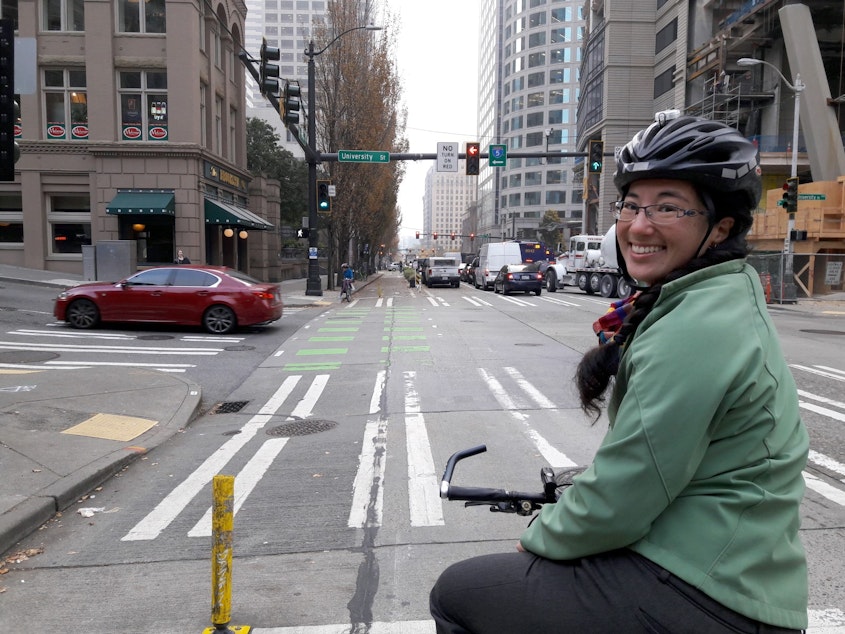Seattle backpedals on bike lane plans

Disappointment: That’s what some bike advocates feel, seeing all the bike projects that won’t get built.
The City of Seattle is cutting over 25 miles of protected bike lanes and greenways from its list of projects to be built in the next five years.
Tom Fucoloro runs the Seattle Bike Blog.
"I think the bike movement is hitting some sort of low point right now," he said. "You get to a low point where it has to be reborn... and I feel like we’re getting to the point where we need a new bike movement that looks different from previous bike movements. We need new leaders to step up and say this isn’t right and we need to change this."
The reasons appear to be partly financial, partly political.
Sponsored
The financial angle
First, there's the money.
The Move Seattle Levy promised over a hundred miles of protected bike lanes and greenways —far more than it could deliver, especially given lower than expected contributions from the federal government.
"We had to change the scope," said Seattle Department of Transportation's Monica DeWald. And this report, she said, was the first time people are seeing the funding shortfall's impact on the city's planned network of protected bike lanes.
A few of the projects being dropped include:
- A 2.6 mile neighborhood greenway connecting Ballard and Crown Hill to Greenwood.
- A 0.29 mile protected bike lane on South Alaska Street.
- A 1.5 mile neighborhood greenway connecting Beacon Hill to Mt. Baker.
- A 1.24 mile protected bike lane on Myers Way South.
SDOT's DeWald said projects that appear dead could in fact still get built, if funding comes through from alternative sources.
The Bicycle Master Plan (BMP) itself is still the goal. Meanwhile, the Implementation Plan represents what can actually be achieved, given current funds. Compared to the BMP, it's like Cinderella, scrubbing floors, hoping one day to attend a ball.
Sponsored
The political angle
But there also appears to be a political angle. Last week, the mayor cancelled plans to build a bike lane on 35th Avenue Northeast following complaints by businesses along the route.
City officials appear to be trying to avoid such conflicts on future bike lane projects by talking more openly about risks that could threaten those bike lane projects still being planned.
For example:
- The report indicates a proposed bike lane through the Pike-Pine corridor might impact businesses by reducing parking and loading areas there.
- A proposed bike lane at Thomas Street near Key Arena has a really tight budget that could prove problematic.
- A proposed bike lane near the Mt. Baker light rail station on Rainier could impact travel times for cars and buses.
SDOT's DeWald said talking about these risks early could give the city more time to resolve them. “It allows for us to have a conversation with community members about what some of the trade-offs would be.”
Or it could just give those controversies more time to grow. City Councilmember Mike O'Brien, who chairs the Sustainability and Transportation Committee, expressed disappointment in the mayor’s apparent timidity when it comes to bike lanes.
"This work has always been controversial, and it remains controversial today," he said. “We have done dozens and dozens of projects where we hear very similar things from community members that are concerned about change. And we know how it turns out because we’ve done it so many times: Businesses don’t fail, they thrive."
Sponsored
In 2015, the news site CityLab surveyed a number of studies on the impact of bike lanes on neighborhood businesses.
Reporter Eric Jaffe summarized the findings this way: "Replacing on-street parking with a bike lane has little to no impact on local business, and in some cases might even increase business. While cyclists tend to spend less per shopping trip than drivers, they also tend to make more trips, pumping more total money into the local economy over time."
Find a full list of bike projects being cut on page 36 of the Seattle's draft implementation plan for the Bicycle Master Plan.




